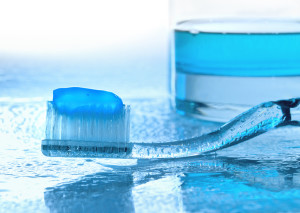Toothpastes
Tooth brushing is carried out to physically remove dental plaque from the teeth. Your brushing technique is more important than the type of toothpaste you use.
A toothpaste that contains fluoride is recommended in most cases. Fluoride helps to prevent tooth decay, including decay of the root surfaces. Patients who have periodontal disease can be at higher risk of developing decay of the root surfaces, making it more important to use a fluoride toothpaste. Toothpastes containing fluoride can also help to reduce tooth sensitivity.
Patients with receding gums may experience tooth sensitivity. Sensitive toothpastes may be useful in such cases. There are several types of sensitive toothpastes available on the market. The most effective sensitive toothpaste for one patient may be different to that for another patient.
Mouth Rinses
Mouth rinses actually play very little role in the treatment of periodontal disease, despite what television advertisements may lead you to believe. It is much more important to develop an effective tooth brushing and flossing technique than to use a mouth rinse.
Periodontal disease is caused by bacteria (plaque and calculus) that accumulates above and below the gum line. There is no mouth rinse that penetrates below the gum line, and therefore, they have very little benefit in the treatment of periodontal disease.
There are certain situations when a mouth rinse may be useful. For example, a mouth rinse that contains fluoride may be useful for patients who are particularly susceptible to tooth decay. A chlorhexidine mouth rinse may also be recommended following a surgical procedure. Your Periodontist or Dental Hygienist will make a specific recommendation if this is suitable for you. It is generally recommended that an alcohol-free product be used when a mouth rinse is needed.

